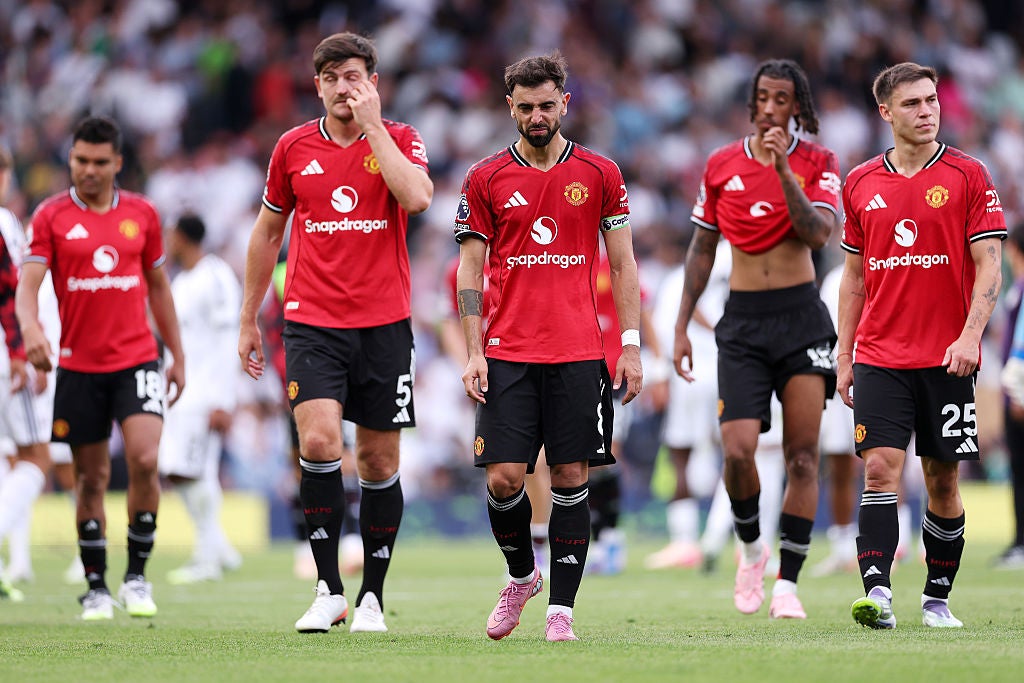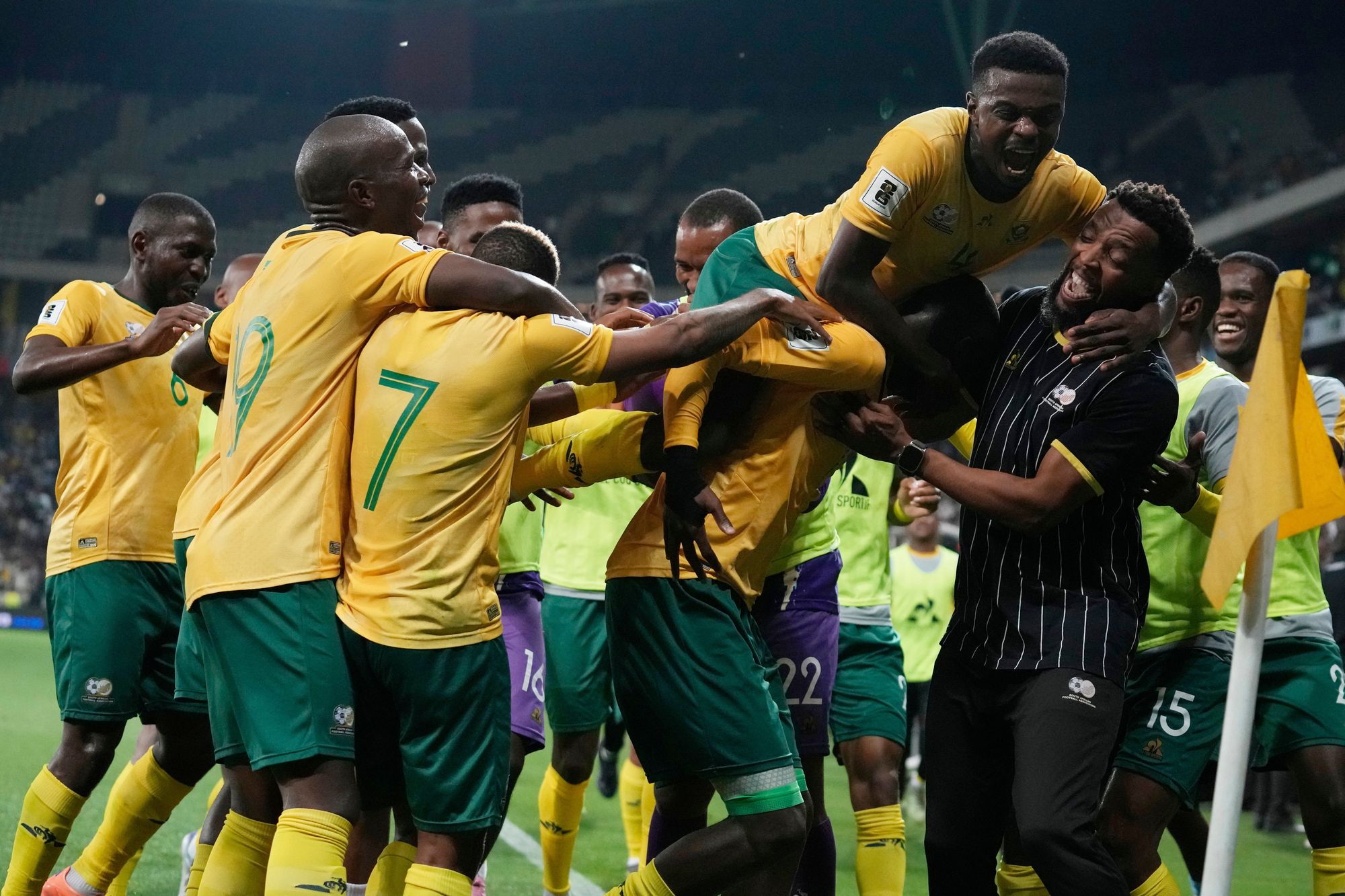

SPORTS
Unbelievable Stats Revealed: The Major Crisis Plaguing Manchester United!
Published
1 month agoon
By
OBS
It is Brentford next, and Ruben Amorim ought to be aware that there is a punishment for Manchester United managers who lose to Brentford. Or there was for Erik ten Hag, anyway. The Dutchman’s second game was a 4-0 reverse at the Gtech Stadium, where the nasty numbers extended beyond the scoreline. Brentford ran 13.8km further than United. So the next day, and in a summer heatwave, Ten Hag made each of his players run 13.8km to compensate. And he, already in his fifties, did likewise.
Which, when United only lost four of their next 40 games, seemed a transformative display of toughness. But, while Ten Hag’s last win as United manager came against Brentford, it was more telling that he was sacked after defeat to West Ham. He visited the London Stadium on three occasions and lost on all three. One of the factors in his ultimate failure as United manager was a malaise against the mid-table clubs.
Amorim has taken this to another level. He goes to Brentford on the back of one of his finest results as United manager, a 2-1 win over Chelsea. His Premier League record is wretched, with just 34 points from 32 games, but it can be divided into three parts.

Against the superpowers, last season’s top four of Liverpool, Arsenal, Manchester City and Chelsea, he has nine points from as many matches; fewer than United may have hoped for, but not actually disastrous, with a couple of victories and only four defeats.
Against the minnows of the promoted clubs, he has an almost impeccable return: 13 points from five outings, a debut draw with Ipswich followed by wins against Southampton, Ipswich, Leicester and Burnley, albeit after trailing in two of those encounters and requiring a 97th-minute decider in a third.
But the major problem is the other 12 clubs, those who, along with United, finished between fifth and 17th last season. For Amorim, Aston Villa, Brentford, Brighton, Bournemouth, Crystal Palace, Everton, Fulham, Newcastle, Nottingham Forest, Tottenham, West Ham and Wolves can constitute a dirty dozen.
His United have played 18 league matches against them and taken just 12 points. They have a mere three victories: a 4-0 rout of Sean Dyche’s Everton, a 1-0 win at Fulham with a deflected goal last season and a final-day defeat of 10-man Aston Villa. Of their three draws, a 2-2 at Everton in February flattered them; a 1-1 at Bournemouth required a 96th-minute equaliser against another side reduced to 10 men.
That return could be even lower. Over those 18 matches, United have scored little more than a goal a game (19) and conceded almost two (31).
The worst element of it may be the seven home defeats; but it is compounded by fortunes in other competitions, by an FA Cup exit to Fulham and Carabao Cup quarter-final and Europa League final defeats to Tottenham which cost United both silverware and a place in Europe this season. Add them and Amorim’s record becomes three wins in 21; depending on whether a loss on penalties counts as a draw or a defeat, it is 14 or 15 of the latter.

So if it may explain why United committed more than £130m to players from the Premier League’s other 12 this summer, in Wolves’ Matheus Cunha and Brentford’s Bryan Mbeumo – if you can’t beat them, buy them – it is revealing.
Amorim’s United can compete as underdogs against the best. They can beat the worst, albeit sometimes with a few alarms. Yet in matches where their resources ought to render them favourites and the league table may make them something approximating to equals, they have tended to be the inferior side.
Certainly, pound-for-pound, United have been the division’s great underachievers. They have spent around £850m on transfers since Ten Hag’s appointment, even if it can be too soon to judge Amorim’s £230m summer outlay. Their wage bill last season was very probably in the top five. They have paid more and got less in return.
But part of Amorim’s problems, and Ten Hag’s before him, has been the strength in depth of the division. The Premier League’s annual £100m-plus payments to its members mean the other 12 all have the ability to recruit and pay quality players. And, indeed, talented managers.
Both Ten Hag and Amorim have looked outcoached by their peers, as more well-configured teams have beaten United. The Portuguese faces a rookie in Keith Andrews on Saturday; losses against the Irishman’s predecessor, Thomas Frank, and coaches such as Andoni Iraola, Nuno Espirito Santo and Oliver Glasner last season, however, felt telling.

United spoke to managers of mid-table teams when considering sacking Ten Hag in the summer of 2024. But perhaps their identity, their status as one of the world’s biggest clubs, their belief they should have one of the planet’s outstanding managers, has prompted them to hire managers with higher winning percentages, untainted by defeats. Ten Hag took Ajax to the Champions League semi-finals, Amorim brought Sporting to two Portuguese titles.
Yet the gulf in resources in the Netherlands and Portugal may mean their equivalents of the Premier League’s Killer B’s – Brentford, Brighton and Bournemouth – have no such strength; that a manager of Ajax or Sporting may not need to get tactics or team selection right to beat them.
That, perhaps, has been the culture shock the Premier League has provided the last two United managers, its sheer competitiveness dragging them down. While United thought they were hiring one of the best young managers in Europe, in Amorim, he became one of the Premier League’s great underperformers.
Especially in these sorts of matches. Where, arguably, his record needs to be about three times as good.
After 12 points from 18 matches against the Premier League’s other dozen, United may want 36 from the next 18. And perhaps the real obstacle course for Amorim was not the start that pitted United against Arsenal, City and Chelsea in five games, but their last 11 matches of 2025: Brighton, Forest, Spurs, Everton, Palace, West Ham, Wolves, Bournemouth, Villa, Newcastle and Wolves again. That will be the real test if Amorim has improved.
You may like
-
Unbelievable Surge: NGX Market Value Skyrockets to N93.8tn! Discover What’s Driving This Uptrend!
-
Unlocking Nigeria’s Economic Future: The Surprising Effects of Policy Easing Revealed!
-


Thousands of Civil Servant Passwords Exposed: Experts Warn of Major Security Threat!
-


Rangers in Crisis: Shocking Setback in Manager Search Leaves Fans Reeling!
-
Unbelievable Surge: Stock Market Rakes in N20bn Gain! Find Out What Happened!
-


2026 World Cup Qualification: Shocking Global Standings Revealed After England Secures Its Spot!
SPORTS
South Africa’s Stunning Comeback: First World Cup Qualifying in 16 Years! Can Nigeria Snatch a Last-Minute Playoff Chance?
Published
2 weeks agoon
October 16, 2025By
OBS
South Africa have qualified for their first World Cup since hosting the tournament 16 years ago, although they had Nigeria partially to thank for their progress.
South Africa beat Rwanda 3-0 in Nelspruit to finish first in Group C as Benin, who had a two-point lead going into the final round of fixtures, tumbled from top place to third in the standings after being thumped 4-0 by Nigeria in Uyo.
Victor Osimhen grabbed a hat-trick to keep Nigeria’s hopes alive as they seek to advance to a playoff next month for the four best runners-up from the nine African qualifying groups.
South Africa finished on 18 points, with Nigeria runners-up ahead of Benin on goal difference as both ended with 17 points.

South Africa had three points deducted last month after being found guilty of fielding a suspended player in an earlier qualifier in March, a mistake they admitted.
But that will be largely forgotten now as South Africa qualified for the first time since they hosted the finals in 2010.
Thalente Mbatha scored after five minutes, and Oswin Appollis netted the second in the 21st minute to put South Africa on their way. Striker Evidence Makgopa made it 3-0 in the 72nd minute with a header from a corner.
For Nigeria, Osimhen opened his account in the third minute from Samuel Chukwueze’s through pass and the same player then crossed for the striker to head home a second in the 37th minute.
He completed his hat-trick soon after halftime, heading home a chipped pass from Moses Simon, but the best goal was the last — thrashed in on the volley by Frank Onyeka.
Algeria secured qualification last week and were hoping to celebrate in front of their fans in Tizi Ouzou on Tuesday, but made heavy weather of it and needed two late penalties from Mohammed Amoura to beat Uganda 2-1.
Amoura went top of the scoring charts in the African qualifiers with 10 goals as Algeria finished their Group G campaign with 25 points.
They handed a debut in goal to Luca Zidane, the son of France World Cup winner Zinedine Zidane, but he was beaten after six minutes as Steven Mukwala gave Uganda a shock lead.
Reuters
SPORTS
Heimir Hallgrimsson Aware of World Cup Challenge Ahead After Armenia Victory: What’s Next?
Published
2 weeks agoon
October 15, 2025By
OBS
Heimir Hallgrimsson admits the Republic of Ireland may need to do something special against Portugal next month if they are to make it to next summer’s World Cup finals.
Ireland’s relief at a hard-fought 1-0 Group F victory over 10-man Armenia was tempered by the news of Hungary’s late equaliser which means they will have to at least deny Cristiano Ronaldo and company at the Aviva Stadium next month before targeting victory in Budapest three days later.
Asked if the 2-2 draw in Lisbon had changed anything, Hallgrimsson said: “Not really, it doesn’t change anything. We always knew that we needed to go to Hungary and have a win there.
“This looks like we need a point against Portugal, or Armenia to do us a favour in Yerevan. We all see that this Armenian team is no roll-over. There’s a big heart, there’s aggression and a spirit that is noticeable.”
Evan Ferguson’s 70th-minute header – his fourth goal in five competitive games for his country – ultimately sealed a vital win at the Aviva Stadium which could, and perhaps should, have been more comfortable after Armenia skipper Tigran Barseghyan’s 52nd-minute dismissal for a headbutt on Finn Azaz.
Ireland were largely passive and uninspired during a lukewarm first half but, aided and abetted by Barseghyan’s premature exit, forced their way across the finishing line to fulfil their head coach’s pre-match prophesy.
Hallgrimsson said: “Listen, we said before this camp we would take a scrappy 1-0 win and it probably was kind of a scrappy 1-0 win, so we can’t be unhappy.
“We’ve been complaining about the second game syndrome – we must be happy that we won the second game; we’ve been complaining about conceding early – we didn’t concede early, we didn’t concede at all, so we kept a clean sheet, that’s a good step.
“We’ll take the positives and carry on to the next window. It’s just a new dawn, it’s a new day next window – this result today doesn’t matter at all.
“We just needed the three points to be alive and have a chance, that’s number one, so we cannot be reading too much into that performance today.
“It was always going to be a tough match for us – we needed to win – and again it’s going to be tough, just a different opponent, players playing higher quality next time.”
Armenia boss Yegishe Melikyan admitted Barseghyan’s rush of blood had cost his side dear, but refused to condemn his indiscipline.
Melikyan said: “Of course, the red card changed the game. It was a mistake.
“He took responsibility. He said sorry to the whole dressing room. But, if a player makes a mistake, it is also my mistake and for that I apologise.
“If there was no red card and we played 11 v 11, I think we could have got a good result. I thought we could have won, but we must go forward and I think we can get good results in the near future.”
SPORTS
Wales Sensation Jess Fishlock Shocks Fans with Surprise International Retirement: What This Means for the Future!
Published
2 weeks agoon
October 15, 2025By
OBS
Wales’ record goalscorer Jess Fishlock has announced her retirement from international football after next week’s friendly against Australia.
The 38-year-old Seattle Reign midfielder, who has scored 48 goals for her country, will play her 166th and final international match against the Matildas at Cardiff City Stadium on 25 October.
Fishlock said: “After 19 years and the most incredible journey of proudly representing my country, I have made the decision that the match against Australia will be my last one in the red of Cymru.
“From kicking my first ball with my brothers in Llanrumney, football has been in my blood.
“When I had my debut against Switzerland in Kloten in 2006, never did I imagine I would have the honour of representing my Cymru more than 150 times. Every minute was a pleasure, a privilege, and an honour.”
Having made her senior international debut against Switzerland in 2006, Fishlock became the first male or female footballer to make 100 appearances for Wales, against Northern Ireland in 2017 and marked her milestone by scoring in a 3-1 win.
She became her country’s leading international scorer in July 2024, notching her 45th goal in a 2-0 European Championship qualifying win against Kosovo.
After helping Wales qualify for their first major women’s tournament at the 2025 European Championship, Fishlock became the oldest-ever scorer in the women’s competition against France, aged 38 years and 176 days.
“The Euros was the pinnacle of my football career, seeing the dragon on the world stage for the first time will be a memory that will stay with me for a lifetime,” she said.
“To all the players and staff, past and present, diolch (thanks). It has been an incredible journey. The team has always felt like a family and after all the good and bad times, we finally achieved what we always dreamed of.”
Fishlock, who began her career at hometown club Cardiff and has had spells at Glasgow City, Melbourne Victory, Frankfurt and Lyon among others, also thanked her wife, former Seattle team-mate Tziarra King, friends and family for their support.
She added: “I love you all. Without the support you have all shown, without you getting me through the difficult moments, I never would have achieved what I achieved.
“To my Mum, a woman whose love and guidance allowed me to chase and reach my dreams. You believed in me before I believed in myself.
“To my wife Tziarra, for learning about our beautiful country and always supporting me and us. Thank you.”
PA
Categories
Top Tags
Related posts






















